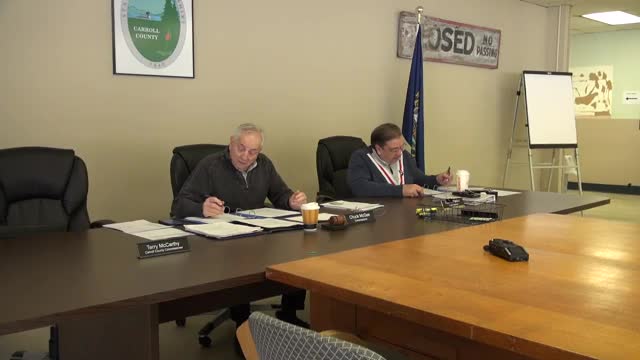Carroll County approves emergency purchase to replace 22‑year‑old sewer control panels
Get AI-powered insights, summaries, and transcripts
Subscribe
Summary
County commissioners authorized an emergency purchase of sewer control panels after staff reported multiple failures that are affecting treatment operations; the county notified the state and waived bidding because of the operational risk.
Carroll County Commissioners on Jan. 17, 2025 approved an emergency purchase to replace failing control panels at the county wastewater treatment system, authorizing the DPW director to place the order and waiving the usual bidding process.
The move came after DPW Director Roy DeWitt told commissioners that the system’s control panels are about 22 years old and that three of the four panels “have gave up operation on us, which are causing a lot of problems in treating our sewage properly.” DeWitt said he secured vendor estimates and urged commissioners to authorize immediate purchase of the panels and necessary ancillary parts.
DeWitt told the board the county’s current cost estimate for immediate needs — not including the electrician’s fee — was “almost $35,000,” and that vendor lead time after ordering could be “6 to possibly 6 to 8 … possibly up to 14 weeks.” He said interim pumping has been required about every 2–3 weeks and that he estimated a ballpark of $1,500 per pumping call for planning purposes.
DeWitt said he had contacted the New Hampshire Department of Environmental Services (DES), which regulates discharge permits, and that DES staff would send levels the plant should not exceed and could provide technical assistance if the plant began to exceed those levels. DeWitt also said the county would notify DES in writing.
Because of the lead time and the operational risk, commissioners approved waiving competitive bidding and authorized the DPW director to order the panels. The board recorded the motion, a second and a voice vote; the motion carried. The transcript records the approved purchase price for the control panels at $17,929.55 and shows commissioners authorized the DPW director to proceed with ordering and coordinating installation, with electricians and programming to follow.
Why it matters: county officials said the failing control panels are the top immediate risk to the treatment plant’s ability to process effluent correctly; vendor lead times and repeated interim pumping create both financial and compliance risk until replacements arrive.
Implementation details and next steps: DeWitt said the county will order the panels promptly and obtain a separate quote for electrician installation. He also said some noncritical repairs can be deferred to later in the year and that the county’s chief financial officer has been notified that the expense was not included in the 2025 budget. DES will monitor permit levels and provide technical assistance if needed.
Board discussion and context: commissioners asked about manufacturer and vendor choices; DeWitt said two of the three primary quotes were from AquaPoint, which he identified as the vendor that custom-built the existing panels. Another commissioner asked whether other local vendors had been consulted; DeWitt said AquaPoint custom builds the panels and provides parts for the county’s system. Commissioners also discussed re-instituting a capital improvement plan and five‑year infrastructure planning for the sewer department.
Ending: The county’s DPW will place the order and schedule installation once parts and electrician availability are confirmed. DES oversight remains in place while the plant operates with interim measures.
